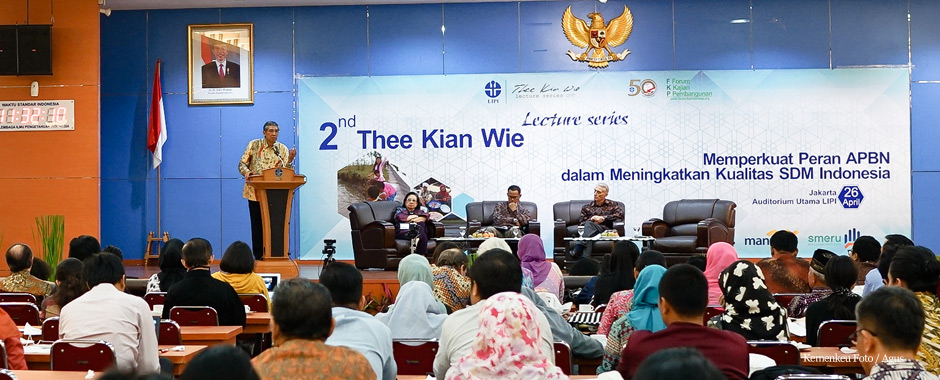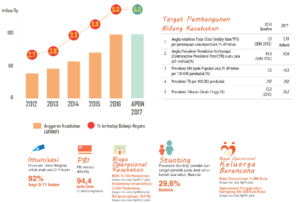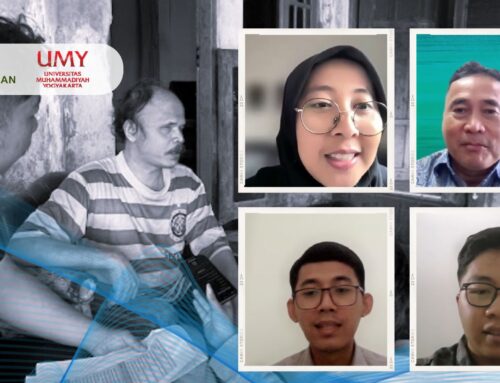Reported by Adinda Rizky Herdianti
The 2nd Thee Kian Wie Lecture Series on 26 April 2017 was the last FKP session at LIPI this year. The speakers were Mardiasmo (Deputy Minister, Ministry of Finance), Prof. Sri Moertiningsih Adioetomo (Professor Emeritus, Universitas Indonesia), Prof. Chris Manning (Adjunct Associate Professor, ANU Indonesia Project), and Latif Adam (Researcher, LIPI). Together they discussed about developing Indonesia’s human capital through proper budgeting.
Deputy Minister Mardiasmo, in his remarks, noted that in addition to infrastructure, development of human resources is needed to lower inequality through improvement in the quality of life. LIPI as a research education is instrumental in improving human resources capacity, such as improving their competitiveness, competence and productivity. He further noted that the Indonesian government is prioritizing several programs in the national budget, such as for the provision of basic vaccination, reducing stunting prevalence, providing scholarships for students and teachers, increasing classroom numbers, and transferring school operational assistance.

Left to right on the stage: Deputy Minister Mardiasmo, Sri Moertiningsih Adioetomo, Latif Adam, Christopher Manning (credit: Kementerian Keuangan RI)
The lecture series was opened by Sri Moertiningsih Adioetomo’s presentation on her well-known study on the demographic dividend and human development. Indonesia is said to be enjoying economic opportunity some time in the future as the productive-aged population increases and dependent population decreases. Some prerequisite conditions should be satisfied first: workers have decent wage and save their money so that investment occurs; more women enter the labor market to heighten productivity; and better human capital. However, Indonesia is not ready yet. A considerable fraction of Indonesia’s younger population who will enter labor force is under-educated and comprehensive social security system is still nearly absence. The combination of both mishaps can cause fiscal burden to the later generations.
Before lagging further in the future, maintaining fertility rate is one of the top priorities to be done. It is also necessary to delve into each step of human life cycle to tackle this problem. At the early stage, particularly the first 1000 days of human life, adequate nutrition-intake is important to develop cognitive skills. Next, the working-age stage requires proper skills and competence. High productivity workers are assets to the economy if they invest their money so the development can be sustainable. It is also necessary to prepare these workers to be independent elderly people. Public financial management plays an important role at each stage: providing education and health care, and establishing social-security system.
Latif Adam shared his agreements with Adioetomo. Worker productivity in Indonesia is relatively low compare to other Southeast Asian countries (only 18% of Singaporean worker productivity), while the minimum wage continues to surge. He emphasized on the slow improvement in the quality of education, considering the amount of national budget allocated for education (Rp416.1 Trill). To improve the quality of Indonesian workforce, Adam recommended the government to help workshops identifying the skills needed by industries and to establish tighter certification policy.
Christopher Manning presented the shifts of Indonesia’s labor policies after the crisis of 1997-98. The government is now focusing on greater protection of wage workers instead of job creation, although it remains one of the employment policies. As the first Asian country to ratify all the key ILO conventions, Indonesia has been imposing higher rate of severance pay and tighter contract, also setting minimum wage based on decent living standard in each region. However, severance pay seems to have been counterproductive. Many firms prefer to hire fixed-term contract worker rather than permanent contract worker. In addition, the non-compliance rate is high: many workers are paid less than the entitled amount of money. This is due to the weak implementation machinery by the government and labor union, large number of informal firms, and the gap with actual conditions in the labor market. On the other hand, minimum wage policy also faces problems in its implementation. There have been strong pressures for the decent living standard to be raised. Increasing the bar would create uncertainty and widen the regional wage inequality. Thus, government revised the minimum wage setting in 2015. Wage increment is currently based on formula setting taken into account the national inflation and growth rates only. To achieve the initial goal of protective labor policies, Manning suggested government to provide selective unemployment government funded benefits to laid-off workers, in return for lower rates of severance pay, and persuade firms to contribute each month to the worker’s individual account (similar to BPJS retirement accounts), rather than paying lump sums.
The lecture provided insights regarding human development in various aspects. It is safe to conclude that implementation and resource distribution are still major setbacks faced by Indonesia. However, Indonesia is currently racing against time to benefit from demographic dividend and better human resource in the future.
Some news coverage of the event are as follows:
- Republika Online SDM Andal Kuasai Teknologi Bisa Majukan Ekonomi
- Harian Nasional: LIPI: Target SDGS Indonesia Terancam Gagal
- Nusa Kini Online: LIPI: SDM dan Iptek Pilar Penting Peningkatan Daya Saing Bangsa






[…] Banda Aceh and Padang (reported here), The Thee Kian Wie Lecture in April hosted by LIPI (reported here), and the 11th Sadli Lecture in May hosted by LPEM FEB UI and the ANU Indonesia Project (reported […]
[…] Aceh and Padang (reported here), The Thee Kian Wie Lecture in April hosted by LIPI (reported here), and the 11th Sadli Lecture in May hosted by LPEM FEB UI and the ANU Indonesia Project […]